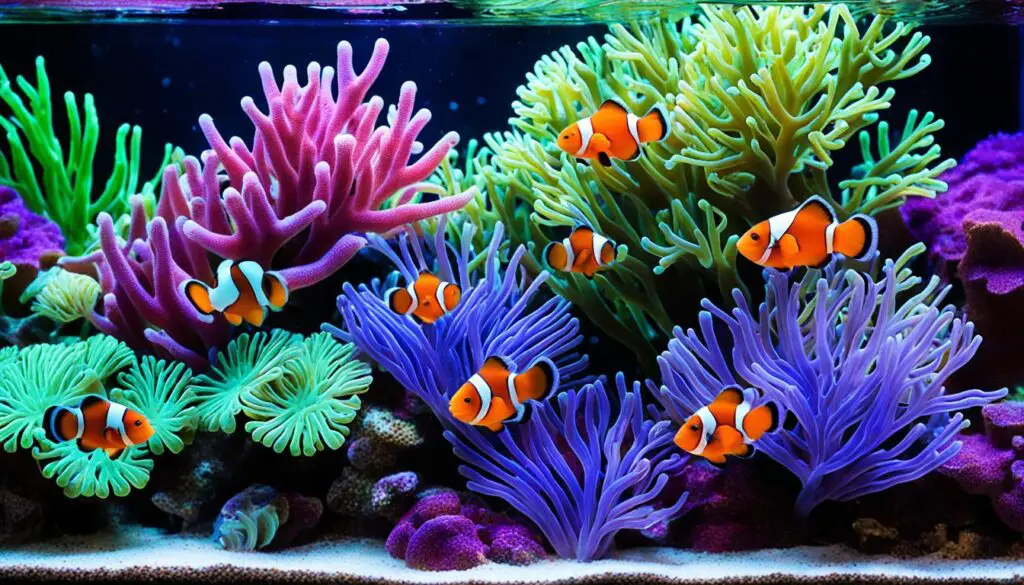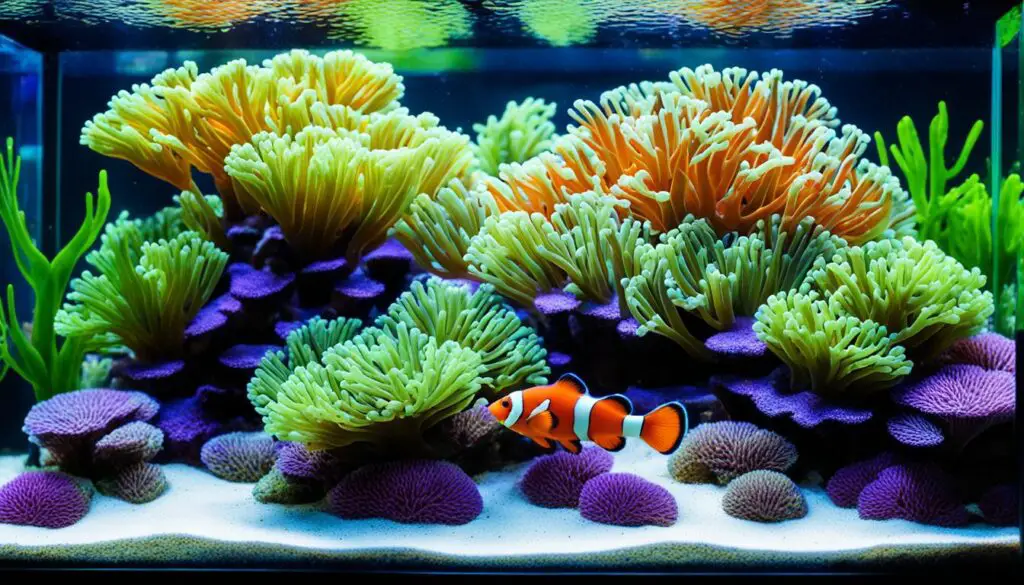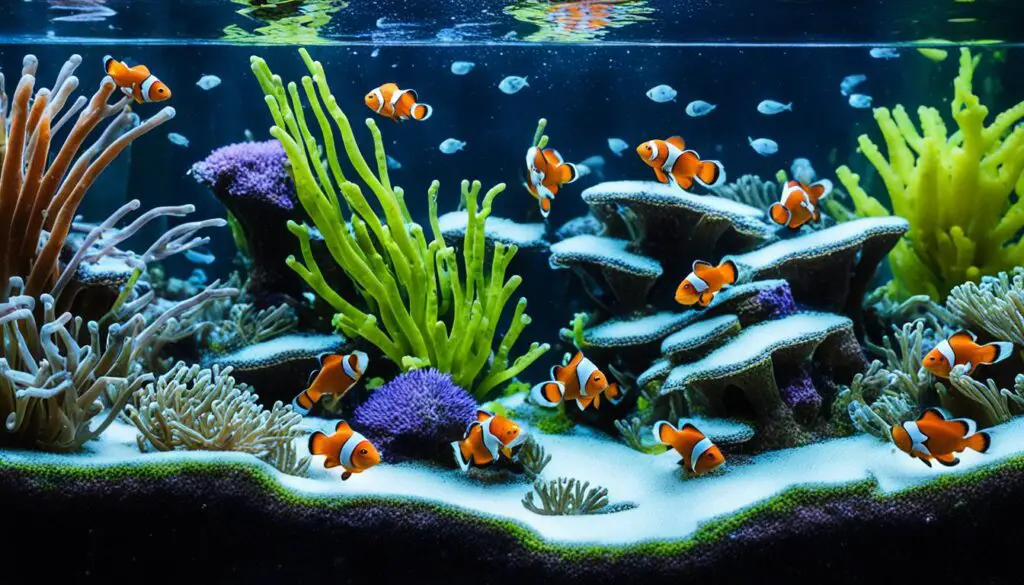Mastering Water Parameters: A Key to Clownfish Tank Health
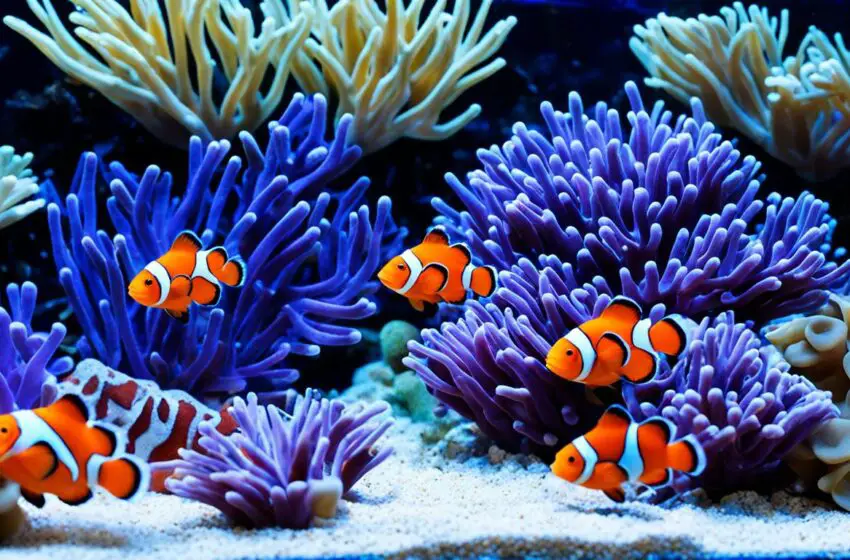
Keeping the right water conditions is vital for your clownfish and other marine life in the tank. Changes in levels like temperature, salinity, and pH can harm them. These changes can even cause algae growth and sickness. Always check on these levels to catch any problems early. This is especially true for reef tanks.
Reef tanks need steady pH, temperature, and salinity. They also need the right amounts of alkalinity, calcium, and magnesium. Know how to use additives and supplements correctly. Testing kits and advice from experts can make sure your tank is perfect for your clownfish.
Key Takeaways:
- The health of clownfish and other marine organisms in a tank depends on maintaining proper water parameters.
- Regular monitoring of temperature, salinity, pH, ammonia, and nitrate is crucial to prevent algae blooms and diseases.
- Reef aquariums require stability in pH, temperature, salinity, alkalinity, calcium, and magnesium.
- Understanding additives and supplements used in the tank is essential for maintaining optimal water conditions.
- Using testing kits, reef calculators, and expert advice can help ensure a thriving clownfish tank.
Importance of Culturing Rotifers for Clownfish Larvae
Culturing rotifers is crucial for breeding and raising clownfish successfully. Rotifers are small invertebrates that act as a main food for clownfish babies.
They can be grown in large numbers through special feeding techniques and equipment. This means you can have millions ready every day. An endless food supply is vital for the young fish to grow well.
Rotifers must be well-fed to be nutritious for the clownfish. A balanced diet helps the fish stay healthy. It ensures they do well in their early life stages.
To keep rotifers healthy, daily checks and regular feeding are key, with good air. These steps allow for their continuous growth and give a steady food supply for the fish.
Rotifers are not just for clownfish. They are also good for reef tanks and corals. They support the entire aquarium’s well-being.
By raising rotifers, aquarists can improve their clownfish breeding. This helps make the marine life in their tanks strong and lasting.
Benefits of Culturing Rotifers for Clownfish Larvae:
- Provides a vital live food source for clownfish larvae in aquaculture
- Enables successful breeding and rearing of clownfish
- Allows for high-density culture and continuous production of rotifers
- Ensures proper nutrition for the clownfish larvae
- Contributes to the health and development of the young fish
- Supports the growth and reproduction of rotifers through daily observations and feeding schedules
- Functions as a live food source for reef tanks and corals
Learning to culture rotifers is key for good clownfish growth. It helps you enjoy a successful ecosystem in your aquarium.
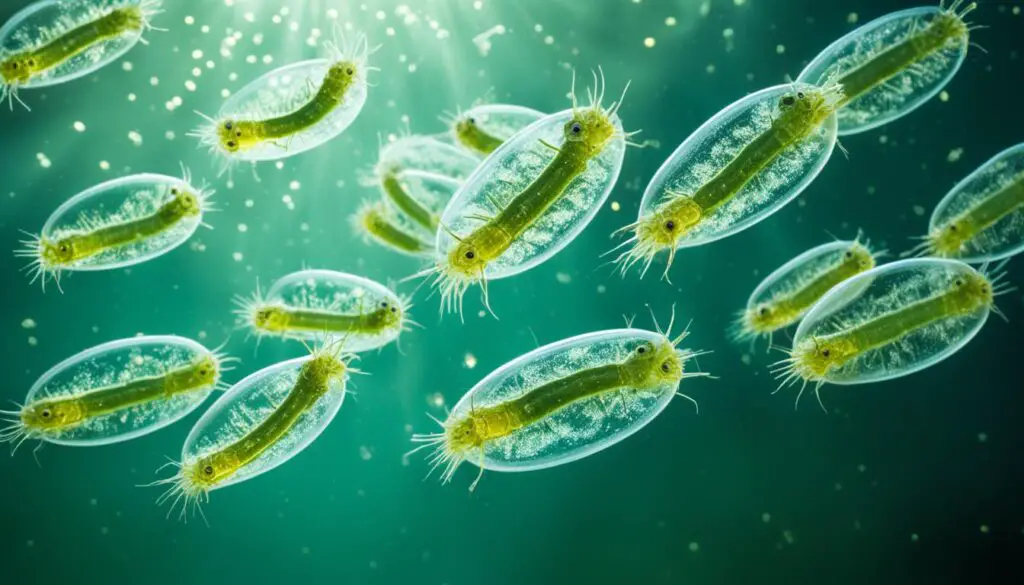
Essential Water Parameters for a Thriving Clownfish Tank
Testing the water quality is a must for everyone who owns an aquarium. This is especially true for those with a clownfish tank. By keeping an eye on certain factors, we can make sure our clownfish live in the best conditions possible.
In a new tank, it’s key to check ammonia, nitrite, and nitrate levels often. If these levels get too high, they can hurt our clownfish. We work to keep ammonia and nitrite low and manage nitrate, making sure our fish stay healthy.
For saltwater reef tanks, we must focus on salinity and temperature. Clownfish do best in water that’s 30-35 parts per thousand. They also need temperatures between 75-82°F. This keeps them from getting sick and stressed.
Even tiny amounts of phosphates can cause too much algae. Testing for and controlling phosphates helps keep the tank clean. It stops algae from taking over, keeping our clownfish’s home healthy.
For the corals in our tank, calcium, alkalinity, and magnesium are essential. They help corals grow strong and healthy. We test and adjust these elements to keep our tank looking beautiful.
Using the right tools to test water is vital for accuracy. We need to regularly check and tweak the water’s condition. This keeps our clownfish in a healthy and happy place.
The Impact of Water Parameters on Clownfish Health
The right water settings are crucial for our clownfish’s health. They need the best water to show their bright colors and avoid sickness. A stable environment reduces stress, letting our clownfish live well in their home.
“The quality of the water determines the quality of life for our fish. By understanding and managing the essential parameters, we can provide a thriving haven for our clownfish.”
All water parameters affect our tank’s balance. A change in one can harm the whole environment. So, we must watch all the factors closely.
Test results help us catch issues early and fix them fast. Keeping an eye on the water lets us maintain a great home for our fish. This promotes their health and long life.
It’s crucial to understand water parameters for our fish’s health and our tank’s success. Good water quality means a happy, thriving environment that mimics their natural home.
| Parameter | Optimal Range for Clownfish |
|---|---|
| Ammonia | 0 ppm |
| Nitrite | 0 ppm |
| Nitrate | |
| Salinity | 30-35 ppt |
| Temperature | 75-82°F (24-28°C) |
| Phosphates | |
| Calcium | 380-450 ppm |
| Alkalinity | 8-12 dKH |
| Magnesium | 1250-1350 ppm |
Note: These values are general guidelines, and it’s important to research specific requirements for the species of clownfish in your tank.
Keeping these water parameters right ensures our clownfish have a great life. Testing, adjusting, and regular monitoring are key. This makes our tank the perfect home for our fish.
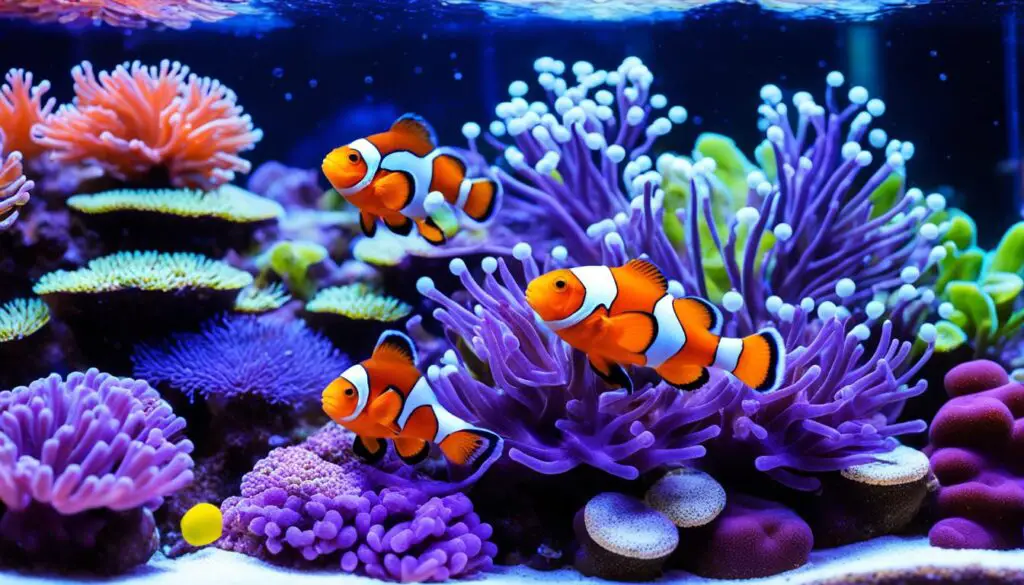
Conclusion
It’s vital to understand water parameters for the health of clownfish and the tank’s ecosystem. By testing important factors like ammonia and salinity, issues like disease and algae can be avoided.
Regular checks and adjustments keep the aquarium perfect for clownfish. This helps us make a place that feels just right for them. A healthy marine world is not just beautiful but lives well too.
Keeping the water clean and balanced is key for the fish’s health. Our clownfish’s future depends on how well we manage their home. This way, both they and their tankmates can do well.
FAQ
Why are water parameters important for a clownfish tank?
Proper water conditions are vital for tank health. Changes in temperature, salinity, and pH might harm the fish. This can also cause algae blooms and diseases.
What are the essential water parameters for a thriving clownfish tank?
For a successful tank, keep water stability. This applies especially to reef tanks. They need right levels of pH, salinity, and more. Checking parameters often is key to spot any changes.
How can I maintain optimal water conditions for my clownfish tank?
Knowing how to use additives is critical. Start by dosing them correctly. Use testing kits and expert advice for a healthy tank. Regular tests keep the water at its best.
Why is culturing rotifers important for clownfish larvae?
Rotifers are crucial for feeding clownfish babies. By culturing them, you ensure success in breeding. They’re also great for feeding corals in reef tanks.
How can I culture rotifers for my clownfish tank?
To culture rotifers, use the right feeds and equipment. Focus on nutrition and keep a close eye on them daily. With proper care, you can grow a lot of them.
What are the important water parameters to test for in a clownfish tank?
Testing for ammonia, nitrite, and nitrate is key, especially in new tanks. You also need to check salinity, temperature, and phosphates. Corals require testing for calcium, alkalinity, and magnesium as well.
How can I ensure optimal water conditions for my clownfish tank?
Regular testing and careful adjustment are how you keep the water right. Watching levels of various elements is crucial. This prevents sickness, algae, and keeps corals healthy.

